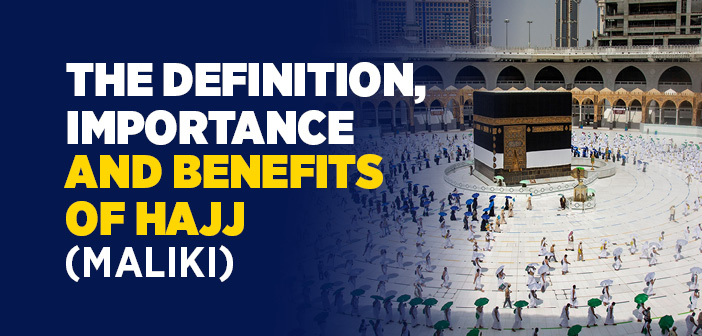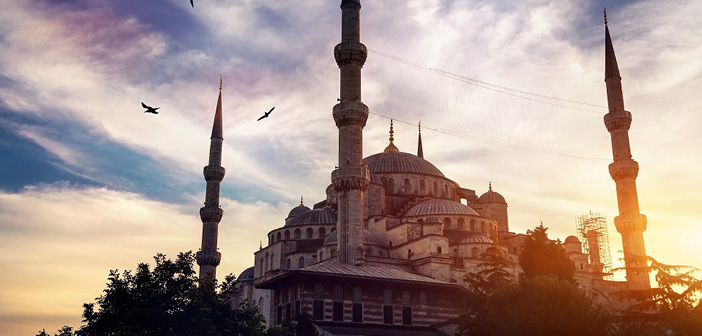What is the definition of hajj? What is the importance of hajj?
Hajj, which is one of the five pillars of Islam, is a financial and physical ibadah that every Muslim, that possesses the needed requirements, must carry out once in their lifetime.
Hajj, as a word; means to visit respectable locations and places.
Hajj as a fiqh term means; To wear the ihram and make a wuquf at Arafat, to perform the sa’y between Safa and Marwah and to make the tawaf around the Kabah in the appropriate manner and to visit the Kabah.
a. The Place of Hajj in our Religion
Hajj was made fardh in the ninth year of the Hijrah. The state of hajj being fardh; is established by the Qur’an, sunnah and ijma (with the consensus of alims).
Allah Ta’ala states the following in the Qur’an:
“And [due] to Allah from the people is a pilgrimage to the House (Hajj) – for whoever is able to find thereto a way. But whoever disbelieves – then indeed, Allah is free from need of the worlds.”[1]
b. The Hikmah and Benefits of Hajj
Hajj, allows us to battle and stone the enemy within ourselves that we call the nafs and also our hateful tendencies. It allows us to stop separating people according to their class and to take refuge in Allah.
An accepted Hajj ibadah, is a means for a person to enter jannah. Rasulullah states: ‘’The reward of Hajj Mabrur is nothing but Jannah!”[1]
It is possible to see the importance of hajj in a hadith that was related from Abu Huraira:
“The Prophet of Allah (peace be upon him) was once asked: “What is the best deed?” He replied: “To have faith in Allah and His Messenger.” The enquirer asked: “What next?” The Prophet (peace be upon him) said: “To strive in the cause of Allah (jihad).” “What is the next best thing?” He replied: “Hajj Mabrur (a faultless Hajj that is free of sin and is graced with Divine acceptance and pleasure).”[2]
In order to be able to perform a mabrur hajj, these five conditions must be observed:
- To have the the most sincere intention when going to hajj, to only go for the sake of Allah. They should act like they are actually going to visit Allah, to not focus on anything but Him.
- To go to hajj with clean, halal earned (tayyib) money.
- To carry out the duties one has due to being a servant to Allah. If they have debts to Allah such as salat and fasting, they must make a definite decision to pay it off and they must start performing the qaza of them,
- To stay away from empty and hateful words, intentions and actions, fights (rafas, fusik, jidal),
- To complete hajj in accordance with its other zahir and batin conditions. Making tawba during hajj, inclining towards Allah, with dua and istighfar, to make the most of hajj with salim amals, is in a way promising Allah Ta’ala that this state will continue after hajj is over.
A hajj that is performed by following its rules for the sake of Allah, is a means for Muslims to purify themselves from sins. Thus our Prophet stated: “Whoever performs Hajj for the sake of Allah and during this time stays away from evil words and opposing Allah, they will return home from hajj like a newborn that is purified of sins.”[3]
Hajj establishes an iman fellowship by bringing Muslims together. It is a way for Muslims from different countries all around the world to meet and to solve one anothers difficulties and problems.
Due to the fact that millions of Muslims have come from many different countries for the hajj ibadah and that they are all acting together at the same time, this is in a way a show of strength to the enemies.
The ihram that is worn during hajj, leads the person in to thinking about death. Everyone wearing the same clothes, during hajj, no matter what their social stature may be and also the crowd at Arafat during the time of wuquf time reminds people of the day of mahshar.
The ihram leads the person in to exploring their inner world. It teaches a person to remain patient in every situation and condition and that it is needed not to become angered with fellow Muslims. The difficulties and deprivations faced during the time of the journey and hajj teaches people the value of nimahs and to be grateful to Allah for them. The forbiddances of the ihram teaches a person to be more compassionate towards animals, plants and needy people and it contributes to establishing a delicate spiritual climate.
Hajj is a very delicate ibadah. Because during hajj many legitimate things are made forbidden. This is why the person should be prepared spiritually for the journey of hajj. Also, the moment a person makes intention for hajj, shaytan will trail along after them. This is why the first weapon people going to hajj must strap on is ‘’sabr’’. Because hajj is an ibadah that is unlike other ibadahs. It may appear easy from the outside, however it is one of the hardest ibadahs. This is this is why this phrase: ‘’O Allah! Make it easy for me!…’’ is included in the sentence of intention.
c. Hikmahs related to the Manasik of Hajj
Hajj, allows the person to live something that is similar to mahshar; it is an ibadah that helps the person to learn the truth ‘’Die before you die!’’.
Hajj, takes place in a mubarak and magnificent atmosphere where Muslims from all over the world gather and meet. The mubarak locations that hajj is carried out in full of divine signs.
Makkah, is the place where ideas of nation, color, nationality, clothing are all removed and forgotten and where the truth that all Muslims are one nation becomes more clear.
Madinah Munawara, is the mubarak city in which our Prophet, who was sent to the world as mercy, and His beautiful sahabah lived. To breathe the air that Rasulullah -sallallahu alayhi wasallam-had breathed gives Muslims a spiritual excitement. Visiting Masjid Nabawi, our Prophet’s grave, the graves of the shahids reminds people of the Asr Saadah. It strengthens the love for the Prophet in people’s hearts, it will make people hold on to the sunnah more tightly.
The Kabah, is the direction in which to direct the ibadah of salat. The ibadah in which Allah wanted to be implemented with his command “Make sujud and come close!’’.
Hajarul Aswad, is the mubarak stone that is given salam to and kissed. It is the stone where the promise of service (by Muslims) and loyalty was given.
Arafat, it reminds people of the rise from the grave to the morning of kiyamah and the hastened gathering of the people at mahshar. All human beings will wait for forgiveness in the presence of Allah in a helpless, needy and hopeful state. Hearts and eyes will become wet with tears of tawba, sincere duas and prayers will rise up to Allah. Clean pages will be opened from the books of their lives and the promise of obedience in the remainder of their lives will be given to Allah.
Muzdalifa, it remoulds the heart with Allah’s greatness, power, magnificent sovereignty and divine manifestations, it is the place where all worldy and earthly things are left behind.
Mina, it is the tawakkul maqam of Hazrat Ibrahim and Hazrat Ismail.
Shaitan stoning, It is the place where Iblis is damned and where the heart is freed of all blindness and waswasa and directed towards Allah. The way to carry out this action is to first stone the inner shaitan of the person.
The Safa and Marwa hills; we remember our Mother Hajar who looked for water, we run to Mawla and take refuge in Him with the feeling that we are helpless creations.
Qurban, It is a rahmah and hikmah that reminds us to pull away from wealth, existence and wants and desires of the nafs and completely submit ourselves to Allah. We do this by living by the example of the submission of Hazrat Ismail.
Our Prophet sallallahu alayhi wasallam has many hadiths concerning this topic. One of these hadiths: “O people! Hajj was rendered fardh for you; perform hajj.“[4]
Our Prophet sallallahu alayhi wasallam, has made clear that hajj is one of the pillars of Islam with this hadith: “Islam has been built upon five things – on testifying that there is no god but Allah, and that Muhammad is His Messenger; on performing salat; on giving the zakat; on Hajj to the House (if the person has the means to go); and on fasting during Ramadhan.”[5]
Hajj is an ibadah that every Muslim, who carries the needed conditions, must perform. It is not jaiz for a person to send someone else to perform the hajj for them if they do not have a valid excuse. However if they are not in a state to go to hajj, in this case they may send someone else as a representative.
The duty of hajj is a glorious duty that must be carried out without delay by every Muslim to whom it is fardh. If a Muslim, goes to hajj and fulfils this ibadah at a time in their life when it is not fardh for them, then this responsibility will be lifted from them. They do not have to perform the hajj again.
A woman to whom the hajj duty is fardh, must go to hajj when she has her mahram next to her. Her husband can not prevent her from going to hajj. However the woman, to whom hajj is not fardh, who wants to perform the nafilah hajj can not go if her husband does not give her permission.
[1] Bukhari, Umrah, 1
[2] Bukhari, Jihad l; Hajj, 4, 34, 102; Umrah, 1; Muslim, Iman,135,140; Tirmidhi, Mawakit,
13, Hajj, 6,14, 88; Darimi, manasik, 8, Salat, 24, 135
[3] Bukhari, Hajj 4; Nesai, Hajj 4
[4] Sahihu’l-Muslim, Kitabu’l-Hajj, IV, 224.
[5] Sahihu’l-Bukhari, Kitabu’l-Iman, I, 19-20.
Source: Fiqh1 (According To The Maliki School Of Islamic Law), Erkam Publications





